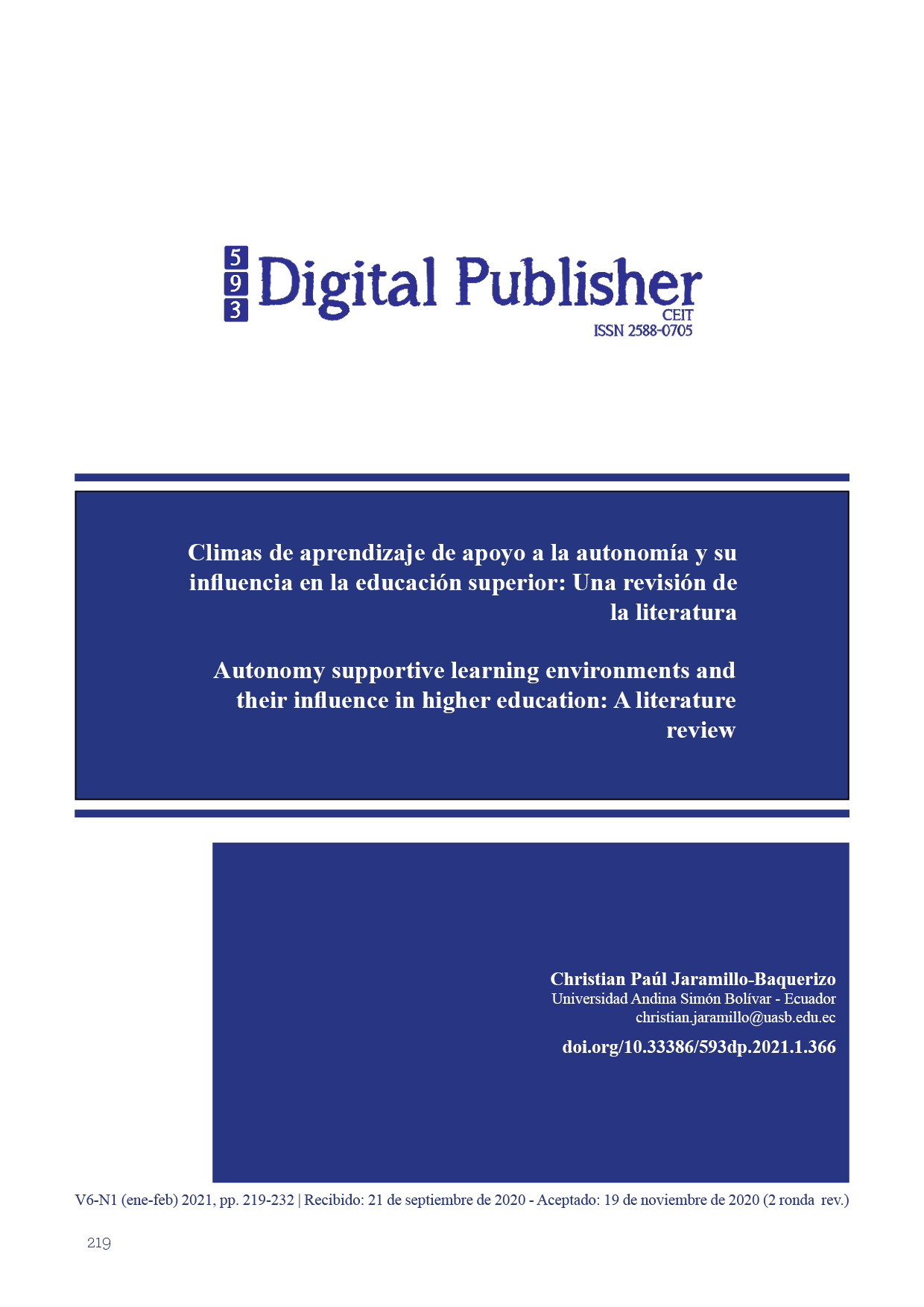Autonomy supportive learning environments and their influence in higher education: A literature review
Main Article Content
Abstract
The concept of autonomy support is a topic of growing interest in educational research given its recognized influence on the learning process. Support for autonomy translates into the generation of learning environments that support the basic psychological needs of students, promoting high-quality autonomous motivation. Given the growing number of investigations, a systematization is necessary to facilitate the understanding of the main areas of influence that these classroom environments generate in the student. Therefore, the present study performs a literature review identifying the main areas of influence generated by learning environments that support the autonomy of higher education students. The results of this research suggest that autonomy supportive environments mainly influence areas related to learning and emotion. Therefore, the present research highlights the need to consider the cognitive aspect, as well as the emotional aspect of the student in the learning process. These results and guidelines that facilitate the generation of supportive climates for autonomy in higher education are discussed.
Downloads
Article Details

This work is licensed under a Creative Commons Attribution-NonCommercial-ShareAlike 4.0 International License.
1. Derechos de autor
Las obras que se publican en 593 Digital Publisher CEIT están sujetas a los siguientes términos:
1.1. 593 Digital Publisher CEIT, conserva los derechos patrimoniales (copyright) de las obras publicadas, favorece y permite la reutilización de las mismas bajo la licencia Licencia Creative Commons 4.0 de Reconocimiento-NoComercial-CompartirIgual 4.0, por lo cual se pueden copiar, usar, difundir, transmitir y exponer públicamente, siempre que:
1.1.a. Se cite la autoría y fuente original de su publicación (revista, editorial, URL).
1.1.b. No se usen para fines comerciales u onerosos.
1.1.c. Se mencione la existencia y especificaciones de esta licencia de uso.
References
Ansong, D., Eisensmith, S. R., Okumu, M., & Chowa, G. A. (2019). The importance of self-efficacy and educational aspirations for academic achievement in resource-limited countries: Evidence from Ghana. Journal of Adolescence, 70, 13–23. https://doi.org/10.1016/j.adolescence.2018.11.003
Bandura, A. (1977). Self-efficacy: Toward a unifying theory of behavioral change. Psychological Review, 84(2), 191–215. https://doi.org/10.1037/0033-295X.84.2.191
Bürgermeister, A., Ringeisen, T., & Raufelder, D. (2016). Fostering students’ moderation competence: the interplay between social relatedness and perceived competence. Teaching in Higher Education, 21(8), 990–1005. https://doi.org/10.1080/13562517.2016.1209183
Chen, B., Vansteenkiste, M., Beyers, W., Boone, L., Deci, E. L., Van der Kaap-Deeder, J., … Verstuyf, J. (2015). Basic psychological need satisfaction, need frustration, and need strength across four cultures. Motivation and Emotion, 39(2), 216–236. https://doi.org/10.1007/s11031-014-9450-1
Demir, M., Burton, S., & Dunbar, N. (2019). Professor–Student Rapport and Perceived Autonomy Support as Predictors of Course and Student Outcomes. Teaching of Psychology, 46(1), 22–33. https://doi.org/10.1177/0098628318816132
Dincer, A., Yeşilyurt, S., Noels, K. A., & Vargas Lascano, D. I. (2019). Self-Determination and Classroom Engagement of EFL Learners: A Mixed-Methods Study of the Self-System Model of Motivational Development. SAGE Open, 9(2). https://doi.org/10.1177/2158244019853913
Duchatelet, D., & Donche, V. (2019). Fostering self-efficacy and self-regulation in higher education: a matter of autonomy support or academic motivation? Higher Education Research and Development, 38(4), 733–747. https://doi.org/10.1080/07294360.2019.1581143
Eakman, A. M., Kinney, A. R., Schierl, M. L., & Henry, K. L. (2019). Academic performance in student service members/veterans: effects of instructor autonomy support, academic self-efficacy and academic problems. Educational Psychology, 39(8), 1005–1026. https://doi.org/10.1080/01443410.2019.1605048
Gerdes, H., & Mallinckrodt, B. (1994). Emotional, social, and academic adjustment of college students: A longitudinal study of retention. Journal of Counseling & Development. US: American Counseling Assn. https://doi.org/10.1002/j.1556-6676.1994.tb00935.x
González, A., Conde, Á., Díaz, P., García, M., & Ricoy, C. (2018). Instructors’ teaching styles: relation with competences, self-efficacy, and commitment in pre-service teachers. Higher Education, 75(4), 625–642. https://doi.org/10.1007/s10734-017-0160-y
Gutiérrez, M., & Tomás, J. M. (2019). The role of perceived autonomy support in predicting university students’ academic success mediated by academic self-efficacy and school engagement. Educational Psychology, 39(6), 729–748. https://doi.org/10.1080/01443410.2019.1566519
Haerens, L., Aelterman, N., Vansteenkiste, M., Soenens, B., & Van Petegem, S. (2015). Do perceived autonomy-supportive and controlling teaching relate to physical education students’ motivational experiences through unique pathways? Distinguishing between the bright and dark side of motivation. Psychology of Sport and Exercise, 16(P3), 26–36. https://doi.org/10.1016/j.psychsport.2014.08.013
Hagenauer, G., Gläser-Zikuda, M., & Moschner, B. (2018). University students’ emotions, life-satisfaction and study commitment: a self-determination theoretical perspective. Journal of Further and Higher Education, 42(6), 808–826. https://doi.org/10.1080/0309877X.2017.1323189
Jang, H., Reeve, J., & Halusic, M. (2016). A New Autonomy-Supportive Way of Teaching That Increases Conceptual Learning: Teaching in Students’ Preferred Ways. Journal of Experimental Education, 84(4), 686–701. https://doi.org/10.1080/00220973.2015.1083522
Jeno, L. M., Danielsen, A. G., & Raaheim, A. (2018). A prospective investigation of students’ academic achievement and dropout in higher education: a Self-Determination Theory approach. Educational Psychology, 38(9), 1163–1184. https://doi.org/10.1080/01443410.2018.1502412
Kiemer, K., Gröschner, A., Kunter, M., & Seidel, T. (2018). Instructional and motivational classroom discourse and their relationship with teacher autonomy and competence support—findings from teacher professional development. European Journal of Psychology of Education, 33(2), 377–402. https://doi.org/10.1007/s10212-016-0324-7
Liu, X., & Flick, R. (2019). The relationship among psychological need satisfaction, class engagement, and academic performance: Evidence from China. Journal of Education for Business, 94(6), 408–417. https://doi.org/10.1080/08832323.2018.1541855
Matos, L., Reeve, J., Herrera, D., & Claux, M. (2018). Students’ Agentic Engagement Predicts Longitudinal Increases in Perceived Autonomy-Supportive Teaching: The Squeaky Wheel Gets the Grease. Journal of Experimental Education, 86(4), 592–609. https://doi.org/10.1080/00220973.2018.1448746
McEown, K., & Sugita-McEown, M. (2019). Individual, parental and teacher support factors of self-regulation in Japanese students. Innovation in Language Learning and Teaching, 13(4), 389–401. https://doi.org/10.1080/17501229.2018.1468761
Nishimura, T., & Sakurai, S. (2017). Longitudinal changes in academic motivation in Japan: Self-determination theory and East Asian cultures. Journal of Applied Developmental Psychology, 48, 42–48. https://doi.org/10.1016/j.appdev.2016.11.004
Núñez, J. L., & León, J. (2019). Determinants of classroom engagement: a prospective test based on self-determination theory. Teachers and Teaching: Theory and Practice, 25(2), 147–159. https://doi.org/10.1080/13540602.2018.1542297
Pintrich, P. R., & De Groot, E. V. (1990). Motivational and Self-Regulated Learning Components of Classroom Academic Performance. Journal of Educational Psychology. https://doi.org/10.1037/0022-0663.82.1.33
Reeve, J., & Jang, H. (2006). What teachers say and do to support students’ autonomy during a learning activity. Journal of Educational Psychology, 98(1), 209–218. https://doi.org/10.1037/0022-0663.98.1.209
Ryan, R. M., & Deci, E. L. (2000a). Intrinsic and Extrinsic Motivations: Classic Definitions and New Directions. Contemporary Educational Psychology, 25(1), 54–67. https://doi.org/10.1006/ceps.1999.1020
Ryan, R. M., & Deci, E. L. (2000b). Self-determination theory and the facilitation of intrinsic motivation, social development, and well-being. American Psychologist, 55(1), 68–78. https://doi.org/10.1037/0003-066X.55.1.68
Ryan, R. M., Deci, E. L., & Vansteenkiste, M. (2016). Autonomy and Autonomy Disturbances in Self-Development and Psychopathology: Research on Motivation, Attachment, and Clinical Process. In Developmental Psychopathology (pp. 1–54). Hoboken, NJ, USA: John Wiley & Sons, Inc. https://doi.org/10.1002/9781119125556.devpsy109
Soenens, B., Sierens, E., Vansteenkiste, M., Dochy, F., & Goossens, L. (2012). Psychologically controlling teaching: Examining outcomes, antecedents, and mediators. Journal of Educational Psychology, 104(1), 108–120. https://doi.org/10.1037/a0025742
Su, Y. L., & Reeve, J. (2011). A Meta-analysis of the Effectiveness of Intervention Programs Designed to Support Autonomy. Educational Psychology Review, 23(1), 159–188. https://doi.org/10.1007/s10648-010-9142-7
Ten Cate, O., Kusurkar, R., & Williams, G. (2011). How self-determination theory can assist our understanding of the teaching and learning processes in medical education. AMEE guide No. 59. Medical Teacher, 33(12), 961–973. https://doi.org/10.3109/0142159X.2011.595435
Thuy Hang, B. T., Kaur, A., & Busthami Nur, A. H. (2017). A self-determination theory based motivational model on intentions to drop out of vocational schools in Vietnam. Malaysian Journal of Learning and Instruction, 14(1), 1–21. https://doi.org/10.32890/mjli2017.14.1.1
Vansteenkiste, M., Aelterman, N., De Muynck, G. J., Haerens, L., Patall, E., & Reeve, J. (2018). Fostering Personal Meaning and Self-relevance: A Self-Determination Theory Perspective on Internalization. Journal of Experimental Education, 86(1), 30–49. https://doi.org/10.1080/00220973.2017.1381067
Vansteenkiste, M., Sierens, E., Goossens, L., Soenens, B., Dochy, F., Mouratidis, A., … Beyers, W. (2012). Identifying configurations of perceived teacher autonomy support and structure: Associations with self-regulated learning, motivation and problem behavior. Learning and Instruction, 22(6), 431–439. https://doi.org/10.1016/j.learninstruc.2012.04.002


